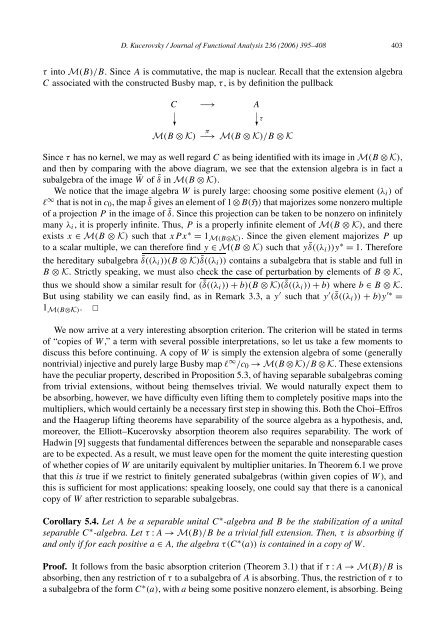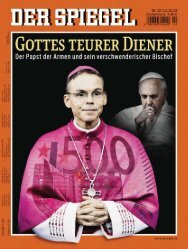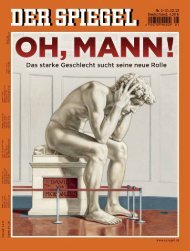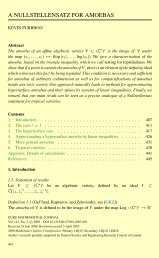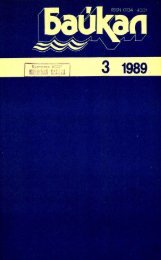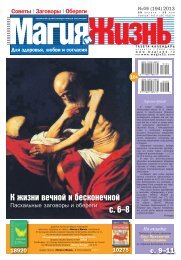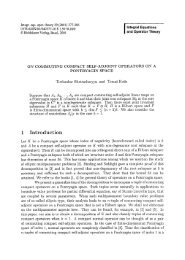Estimation optimale du gradient du semi-groupe de la chaleur sur le ...
Estimation optimale du gradient du semi-groupe de la chaleur sur le ...
Estimation optimale du gradient du semi-groupe de la chaleur sur le ...
You also want an ePaper? Increase the reach of your titles
YUMPU automatically turns print PDFs into web optimized ePapers that Google loves.
D. Kucerovsky / Journal of Functional Analysis 236 (2006) 395–408 403<br />
τ into M(B)/B. Since A is commutative, the map is nuc<strong>le</strong>ar. Recall that the extension algebra<br />
C associated with the constructed Busby map, τ , is by <strong>de</strong>finition the pullback<br />
C −→ A<br />
τ<br />
<br />
<br />
π<br />
M(B ⊗ K) −→ M(B ⊗ K)/B ⊗ K<br />
Since τ has no kernel, we may as well regard C as being i<strong>de</strong>ntified with its image in M(B ⊗ K),<br />
and then by comparing with the above diagram, we see that the extension algebra is in fact a<br />
subalgebra of the image ¯W of ¯δ in M(B ⊗ K).<br />
We notice that the image algebra W is purely <strong>la</strong>rge: choosing some positive e<strong>le</strong>ment (λi) of<br />
ℓ ∞ that is not in c0,themap¯δ gives an e<strong>le</strong>ment of 1⊗B(H) that majorizes some nonzero multip<strong>le</strong><br />
of a projection P in the image of ¯δ. Since this projection can be taken to be nonzero on infinitely<br />
many λi, it is properly infinite. Thus, P is a properly infinite e<strong>le</strong>ment of M(B ⊗ K), and there<br />
exists x ∈ M(B ⊗ K) such that xPx ∗ = 1M(B⊗K). Since the given e<strong>le</strong>ment majorizes P up<br />
to a sca<strong>la</strong>r multip<strong>le</strong>, we can therefore find y ∈ M(B ⊗ K) such that y ¯δ((λi))y ∗ = 1. Therefore<br />
the hereditary subalgebra ¯δ((λi))(B ⊗ K)¯δ((λi)) contains a subalgebra that is stab<strong>le</strong> and full in<br />
B ⊗ K. Strictly speaking, we must also check the case of perturbation by e<strong>le</strong>ments of B ⊗ K,<br />
thus we should show a simi<strong>la</strong>r result for (¯δ((λi)) + b)(B ⊗ K)(¯δ((λi)) + b) where b ∈ B ⊗ K.<br />
But using stability we can easily find, as in Remark 3.3, a y ′ such that y ′ (¯δ((λi)) + b)y ′∗ =<br />
1M(B⊗K). ✷<br />
We now arrive at a very interesting absorption criterion. The criterion will be stated in terms<br />
of “copies of W ,” a term with several possib<strong>le</strong> interpretations, so <strong>le</strong>t us take a few moments to<br />
discuss this before continuing. A copy of W is simply the extension algebra of some (generally<br />
nontrivial) injective and purely <strong>la</strong>rge Busby map ℓ ∞ /c0 → M(B ⊗ K)/B ⊗ K. These extensions<br />
have the peculiar property, <strong>de</strong>scribed in Proposition 5.3, of having separab<strong>le</strong> subalgebras coming<br />
from trivial extensions, without being themselves trivial. We would naturally expect them to<br />
be absorbing, however, we have difficulty even lifting them to comp<strong>le</strong>tely positive maps into the<br />
multipliers, which would certainly be a necessary first step in showing this. Both the Choi–Effros<br />
and the Haagerup lifting theorems have separability of the source algebra as a hypothesis, and,<br />
moreover, the Elliott–Kucerovsky absorption theorem also requires separability. The work of<br />
Hadwin [9] suggests that fundamental differences between the separab<strong>le</strong> and nonseparab<strong>le</strong> cases<br />
are to be expected. As a result, we must <strong>le</strong>ave open for the moment the quite interesting question<br />
of whether copies of W are unitarily equiva<strong>le</strong>nt by multiplier unitaries. In Theorem 6.1 we prove<br />
that this is true if we restrict to finitely generated subalgebras (within given copies of W ), and<br />
this is sufficient for most applications: speaking loosely, one could say that there is a canonical<br />
copy of W after restriction to separab<strong>le</strong> subalgebras.<br />
Corol<strong>la</strong>ry 5.4. Let A be a separab<strong>le</strong> unital C ∗ -algebra and B be the stabilization of a unital<br />
separab<strong>le</strong> C ∗ -algebra. Let τ : A → M(B)/B be a trivial full extension. Then, τ is absorbing if<br />
and only if for each positive a ∈ A, the algebra τ(C ∗ (a)) is contained in a copy of W.<br />
Proof. It follows from the basic absorption criterion (Theorem 3.1) that if τ : A → M(B)/B is<br />
absorbing, then any restriction of τ to a subalgebra of A is absorbing. Thus, the restriction of τ to<br />
a subalgebra of the form C ∗ (a), with a being some positive nonzero e<strong>le</strong>ment, is absorbing. Being


